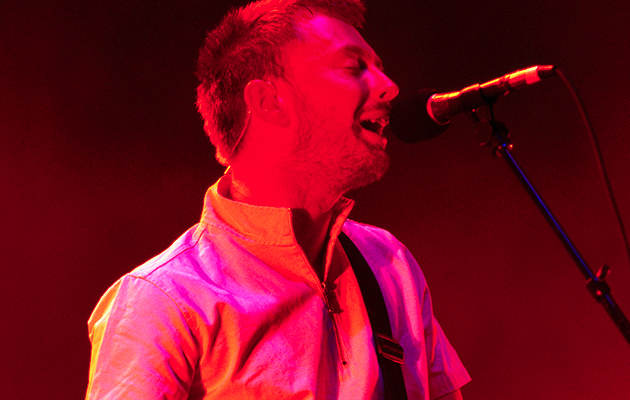"We thought we were trapped in one of those Twilight Zone slow time machines…" With Amnesiac, their second smash hit album of uneasy listening in just over six months, at the top of the charts on both sides of the Atlantic, Radiohead are even more determined to retain their anonymity. As for Thom ...
Over the past year, Radiohead have busied themselves with non-band projects and personal concerns. O’Brien joined an all-star supergroup with Johnny Marr, Tim Finn, and Lisa Germano in New Zealand. Yorke sang a duet on PJ Harvey’s album. In February, his first son was born.
Meanwhile, Amnesiac was released last month to very positive reviews, completing the cycle started by Kid A. “One kind of answers the questions that the other one throws up, maybe that’s the best way of saying how they are related,” says Yorke. “I think it makes much more sense of Kid A. It explains Kid A in a cool kind of way. But it’s nice to get it all finished and move on.”
Contrary to advance press speculation, Amnesiac proved easily as experimental as its sister album, although some of its crackly textures sound more antique than futuristic. If Kid A resembled a sense-warping bulletin from the mid-21st century, its sequel seems to excavate the lost musical civilisations of the mid-20th Century – especially the progressive jazz moodscapes of Miles Davis, Charlie Mingus and Chet Baker. One track, the sublime “Life In A Glass House”, even features 80-year-old veteran jazz trumpeter Humphrey Lyttelton and his band. Having mapped the sci-fi fringes of (post-)rock on OK Computer and Kid A, Radiohead are now reinventing the pre-rock past.
Amnesiac arrived in the same week as Tony Blair’s historic second election landslide. Pure coincidence, of course, but one track, “You And Whose Army”, has been widely interpreted as an attack on the prime minister. Yorke has lambasted Blair in the past, but plays down any personal animosity. “It is,” he says, “about anybody who is put in a position of power and is then surrounded by his cronies and goes off and does this thing and doesn’t feel that he’s answerable to anybody.”
Blair, Yorke argues, is merely a “point man” for the shadow forces of globalisation. “He’s just a pawn, a cog in the wheels. But politicians are being incredibly naïve if they think people are going to sit down and let it happen. They won’t, I don’t think. They’re not that fucking stupid.”
By the end of our two-hour chat, Yorke has eased his foot off the paranoia pedal, laughed seven times, smiled five, and taken the piss out of himself twice. Is he more at ease with himself these days?
“Oh yes, big time,” he nods. “In a superficial, late twenties kind of a way. Hitting 30, entering 32, about to probably visit 33. Mellowing out, beards, big cars, baking your own bread. Definitely. Just growing up, really. Growing up is something to be proud of. Unless you’re The Rolling Stones, of course.”
The Oxford oddballs have undoubtedly moved rock forward, expanding the grammar of pop with Kid A and Amnesiac. Their importance in the coming decade depends on whether their vast global fanbase is prepared to follow them into uncharted waters, and whether other mainstream rock acts will pick up the gauntlet they have thrown down.
Another transatlantic chart smash, Amnesiac is the first Radiohead album not to include lyrics. “I’ve sort of changed my relationship with the words I sing on this one,” Yorke tells Uncut. “It’s much less confessional. I’ve really just fucking had enough of that.”
Funnily enough, he said that around the release of the last album. And the one before that. “That’s right, yes. Bugger! Shit! All right, it’s less than it was – all right? “Pyramid Song” is hardly what you’d call confessional, really… although it is.”
Cryptic, evasive, a conspiracy theorist, even. But Thom Yorke’s decade-long experiment in “How To Disappear Completely” has been a failure – thank God. The sheer emotional charge you get from Radiohead is something that sets them apart from the competent strummers and techno boffins.



